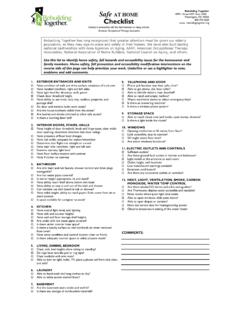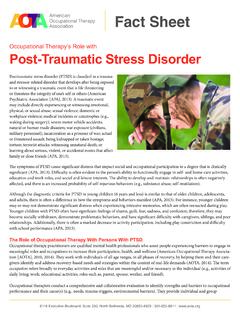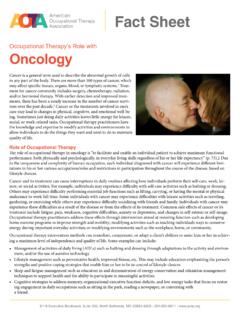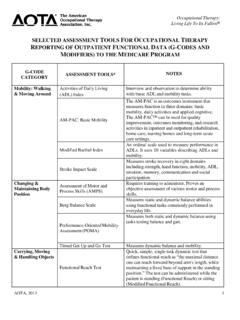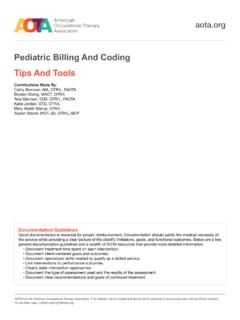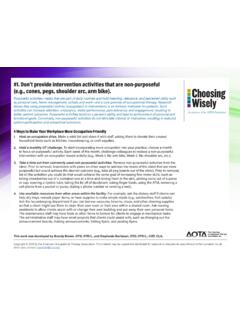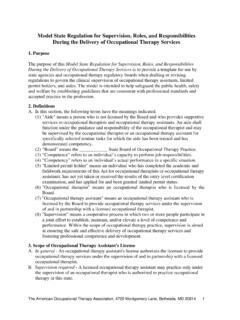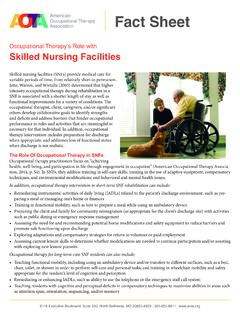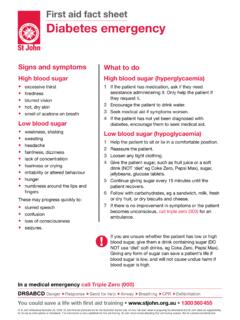Transcription of Diabetes Fact Sheet - American Occupational Therapy ...
1 Occupational Therapy practitioners can play a strong role in diabe-tes education and self-management for individuals who are likely to develop the disease as well as those who are already is characterized by hyperglycemia (high blood glucose) resulting from the body s inability to use the sugar from food eaten for energy. It is a systemic disease that can affect the body on both an immediate and a long-term basis. The most prevalent acute complication is hypoglycemia or low blood glucose. Hy-poglycemia is a potentially life threatening condition requiring immediate and appropriate treatment. When blood glucose levels are persistently high, a wide range of chronic complications can occur. These can include kidney disease, vision loss, heart dis-ease, stroke, and neuropathy, among others. Many of these long-term complications can be barriers to performance of activities necessary to successfully self-manage Diabetes . Diabetes is also frequently accompanied by depression and Therapy practitioners are experts at analyzing the performance skills and patterns nec-essary for people to engage in their everyday activities (occupations).
2 They can effectively educate and train persons at risk for or who currently have Diabetes to modify current habits and routines and develop new ones to promote a healthier lifestyle and minimize disease progression. Occupa-tional Therapy practitioners can assist clients to develop simple, concrete, measurable, and achievable self-management goals con-sistent with the seven behaviors advocated by the American Association of Diabetes Educators (AADE). These AADE 7 Self-Care Behaviors are: (1) healthy eating, (2) being active, (3) monitoring, (4) taking medications, (5) problem solving, (6) healthy coping, and (7) reducing Some behaviors, such as healthy eating, are self-explanatory, whereas others are more involved. For example, monitoring includes not only blood glucose testing but also tracking blood pressure, weight, foot health, and steps walked to ensure the person is getting enough physical activity. Similarly, reducing risks encompasses a diverse group of behaviors including, but not limited to, smoking cessation; foot self-inspections; maintenance of personal health records; and regular eye, foot, and dental exams, creating a need for clients to track and diligently attend appointments with their Diabetes health care team.
3 According to AADE s disabilities position statement, occupation-al Therapy practitioners are viewed as part of the Diabetes self-care Occupational Therapy practitioners are knowledge-able about the impact of medical conditions on an individual s day-to-day and long-term functioning. Through their holistic approach they address the physical, cognitive, psychosocial, and sensory aspects inherent in the performance of everyday life activities. Occupational Therapy practitioners develop a collab-orative relationship with their clients to prioritize what they want and need to accomplish which is critical in a disease requiring self-management 24 hours per day, 7 days per week. Occupational Therapy practitioners can modify or adapt how their clients perform their desired self-care tasks to promote ease and success in achieving their goals in managing this disease. Occupational Therapy s Role with Diabetes Self-ManagementFact Sheet6116 Executive Boulevard, Suite 200, North Bethesda, MD 20852-4929 | 301-652-6611 | by Debra A.
4 Sokol-McKay, MS, OTR/L, CDE, SCLV, CVRT, CLVT, for the American Occupational Therapy Association. Copyright 2011 by the American Occupational Therapy Association. All rights reserved. This material may be copied and distributed for personal or educational uses without written consent. For all other uses, contact Therapy enables people of all ages live life to its fullest by helping them to promote health, make lifestyle or environmental changes, and prevent or live better with injury, illness, or disability. By looking at the whole picture a client s psychological, physical, emotional, and social make-up Occupational Therapy assists people to achieve their goals, function at the highest possible level, maintain or rebuild their independence, and participate in the everyday activities of Can an OT Practitioner Do for a Person With Diabetes ? Occupational Therapy practitioners can fill diverse roles when working with clients to prevent and manage Diabetes , including those who have developed a disability.
5 They can incorporate general Diabetes information into their instruction or they can specialize by adapting information to a particular population ( , persons with vision loss or amputations) or to a particular topic (carbohy-drate counting or physical exercise). By way of example, the Occupational Therapy practitioner can: Promote healthy food choices and safe cooking methods; Instruct in safe and appropriate ways to incorporate exercise and physical activity into daily routines; Provide techniques to organize and track medications; Instruct in the use of low-vision and nonvisual devices to draw up and measure insulin; Instruct and provide strategies to successfully use a talking blood glucose monitor or use any blood glucose monitor one handed; Incorporate protective techniques and compensate for peripheral sensory loss in activities that involve exposure to heat, cold, and sharp objects; Educate in techniques to structure time and simplify activities to cope with depression such as breaking down dietary changes and an exercise program into manageable steps and incorporating them into present daily Can Benefit, and Where Are Such Services Provided?
6 Persons who can benefit from Occupational Therapy range from those who would like to implement a lifestyle that reduces the risk of Diabetes to those who already have Diabetes and complications that interfere with their ability to complete self-care activities and manage the disease. Clients of any age with Diabetes can benefit from Occupational Therapy to address their specific self-care needs and preferences. Occupational Therapy can be provided in a wide range of settings, such as a client s home, an outpatient clinic, or a hospital. It can also be provided through a program that focuses on wellness and prevention or one that focuses on medical treatment and reha-bilitation for complications resulting from Diabetes . Sometimes Occupational Therapy is available in a more specialized setting such as a Diabetes clinic or low vision program. Services can be provided on a one-to-one basis or within a group and, depending on the topic, can include oral instruction, demonstration, hands-on experiences, group activities, and role playing.
7 Conclusion Occupational Therapy focuses on lifestyle modification, health promotion, remediation of physical and visual impairments, and maximizing self-care independence, all of which are directly and adversely affected by Diabetes and its complications. Occupational Therapy practitioners focus on helping clients take charge of their Diabetes as opposed to being controlled by it, so they can partici-pate in everyday American Association of Diabetes Educators. (n. d.). AADE 7TM self-care behaviors. Retrieved December 4, 2010, from , A., Sokol-McKay, D. A., Bartos, B., Chynoweth, M., Gerwitz, A., Kleinbeck, C., et al. (2009). Disabilities position statement of the American Association of Diabetes Educators. Diabetes Educator, 35(1), 41 , D. A. (2010). Vision rehabilitation and the person with Diabetes [Special issue: Diabetes care]. Topics in Geriatric Rehabilitation, 26(3), 241 249.

